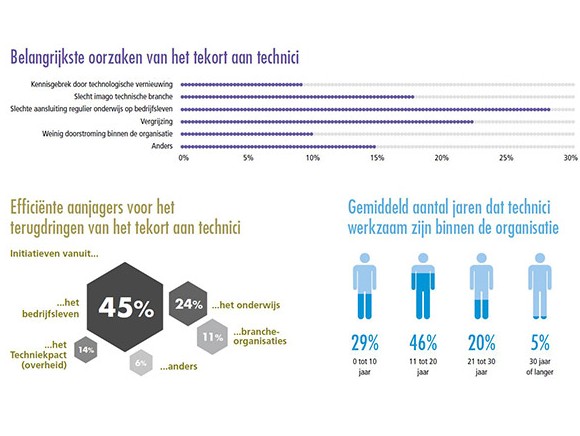
“The biggest challenge for the sector continues to be the shortage of technically skilled workers,” states John Huizing, managing director of ROVC in his introduction in the ‘TechBarometer’ report. “The shortage has been visible for years and it is still growing. It is with good reason that the Dutch government launched a ‘Technical Pact’ in 2013, aimed at encouraging young people to choose to study technical subjects, to improve the transition from technical training courses to the job market and to retain technically skilled workers in relevant roles. It was a worthy initiative, but unfortunately it was announced recently that the funding for this project is to be substantially reduced. Besides that, in view of the current change of Dutch government, it remains to be seen what the new policy will be. That’s why my advice to the sector is: don’t wait and see; take the reins yourself instead – not least because respondents indicate that private-sector initiatives are most effective in reducing the shortage of technically skilled workers.”
It is in companies’ own interests to provide technical workers with extra training, but HR managers are regularly in the dark when it comes to selecting the right training course for technical staff; almost a quarter of them (24%) say that they find it difficult, according to the ROVC TechBarometer (Dutch Only) – a study in which 1,164 respondents from the technical sector answered questions about market trends, HR trends and training trends within the technical field.
Apart from choosing the right training course, there are other challenges too. HR managers within technical companies find it difficult to motivate employees to attend a training course (15%). This challenge is closely followed by offering the right practical support during the learning programme (14%). Ensuring that employees have time to receive training and ensuring that they put their new skills into practice on the work floor share fourth place with 12 percent each.
“There are many gains to be made in terms of effective training,” says John Huizing, managing director of ROVC. “Managers should prepare an overview of what people can already do and what they need to be able to do. By comparing the existing competences against the ideal profile, it’s easy to see which competences an employee is lacking. This gap forms the basis for each employee’s personal development plan. You should then look at the organisation’s need for technical skills in order to choose a practically oriented training course. Additionally, it’s important that the employee’s supervisor understands what the training course entails. This not only makes it easier to offer the employee the right guidance, but it also ensures that the training is aligned with the real-life work situation. As a result, the technically skilled worker finds the training more satisfying.”

The key reason for the shortage is the mismatch between the regular education system and working life. This is followed by the ageing population and the sector’s poor image. Many people still seem to think that a technical job means getting your hands dirty, but that’s no longer the case. Nowadays, most technically skilled workers actually spend most of their time sitting at a computer. In order to shake off that poor image, the sector needs to show that the prevailing view of a technical career is outdated. Besides that, it is necessary to improve the alignment between education and working life to boost the inflow of technical talent – not only to tackle the current shortage, but also to anticipate the effects of the ageing population. According to the respondents, private-sector initiatives are most effective in stemming the shortage.
The ROVC TechBarometer study provides insight into all the relevant trends for the technical sector. The report is available free on request via www.rovc.nl/techbarometer (Dutch Only).
Source: ©Pixabay